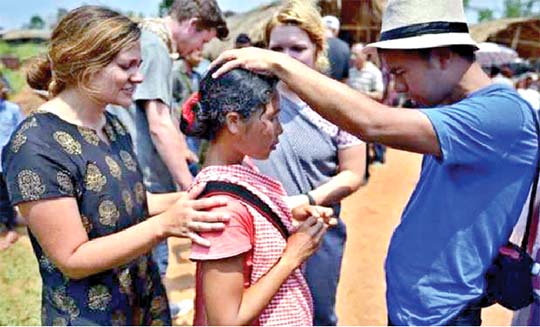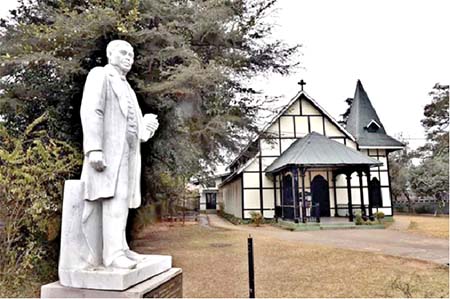The Khasi community has been one of the worst sufferers of the missionary tactics of spreading hate and discrimination. To comprehend the enormity of damage, it is essential to understand what were those priceless traditions and customary practices that we have lost. We must also revisit the glorious history of the tribes as a whole.
There are significant concentrations of Christian denominations in almost all the North Eastern states, where the indigenous faiths and practices are virtually nearing extinction.
THE AGENDA
It all started in 1841 when the first Welsh missionary set foot on the hills of the Cosya or Khasi Hills in present-day Meghalaya. Within two to three years, the missionaries succeeded in converting two Khasi tribes. The process was unstoppable thereon and spread at an alarming rate to each and every corner of the region. As per the latest census, the Christian denomination is now over 80 per cent, reducing the indigenous faith or the Adivasi of Khasi land to less than eight per cent.
The East India Company entrusted the spread of ‘education’ to Welsh Missionary Thomas Jones. Christians credit Jones with giving the written Roman script to the Khasis. The sole objective of spreading education was to enable the Khasis to read the Bible. Jones also translated the Bible into
Khasi or the local language.
PRE-COLONISATION ERA
The crucial question here is: Were the Khasis illiterate before the introduction of the Roman script? The answer is: No. There were many Khasi writers and thinkers whose works and vision remain matchless till today, such as Babu Jeebon Roy Mairom, U Soso Tham, Radhon Singh Berry and others. Babu Jeebon Roy Mairom translated many books such as Ram Charitra Manas and Bhagwad Gita, to name a few. Radhon Singh Berry wrote the value education books ‘Ka Jingsneng Tymmen’ or ‘The Teaching of Elders’.
The Khasis are living proof of being the only surviving matrilineal system of society. The lineage is taken from the mother’s side. The mother is the custodian of all ancestral properties. The mother shall govern the affairs at home, teach her children values and ethics, the way of life and much more. The father, or man of the house, shall represent the clan and the family in the Dorbar or any affairs conducted for the welfare of the society at large.

The Khasis adhere to four significant tenets – To earn Righteousness; To live life by knowing man and knowing God; To live life knowing your maternal and paternal relations, so as to avoid marriages among the same clan for it is an unpardonable sin; and To love yourself dearly and respect others.
The traditional Dorbar of the Khasis is purely democratic, though it has its own unique system of administration that astonished the British. The Khasi Dorbar was known to be far better than the proceedings conducted in British Parliament.
DIVIDE AND RULE
The Christian missionaries used the Divide and Rule policy from the start and imposed the use of Roman script among the Khasis, removing the Bangla script that was commonly known. Soon they included teachings and hymns from the Bible and made it a compulsory subject. Everything taught in their schools was contrary to the teaching of our elders since time immemorial.
Christian missionaries teach the converted (Khasis) to disrespect and avoid mingling with their original community, convincing them that the Khasis are untidy, unholy and barbarians. Their sacred ethnic traditions are specifically targeted, thus breaking the social fabric of the land
Babu Jeebon Roy realised what the missionaries were teaching – the students were being made to learn by heart the sentence: ‘You are a born sinner, your mother, father and your ancestors are sinners, the curse of your self-respect”. He then decided, along with other visionary Khasi leaders, to start a school and spread the knowledge and wisdom of the ancestors to the younger generation. He also pointed out that there should be a school for higher studies too, but the missionary paid no heed. Thomas Jerman Jones replied to him: “We have come for religion and not for education”. This reply shocked Babu Jeebon Roy, and in 1880, he himself started a school from which his eldest son Sib Charan Roy was the first student to pass the intermediate examination. This school is now known as the Government Boys Secondary School, at Jaiaw Shillong. This was the first ever school in the North Eastern states. Students from different parts of the region came to study here.
Babu Jeebon Roy also introduced a printing press and bullock carts in Shillong, competed in limestone mining with the British, taught the Khasis to grow Banaspati, coffee, trade with the plains, grow potatoes for supply purpose and not limited only for domestic use. Babu Jeebon Roy’s contributions toward the modern Khasi society earned him the title ‘Father of Modern Khasis’.
STRATEGY OF DISRESPECT
The missionaries look upon the Khasi way of life with disdain and also teach the converted (Khasis) to disrespect and avoid mingling with their original community, convincing them that Khasis are untidy, unholy and barbarians. Herbert Jones, a missionary, went to the extent of terming the tunes, musical folklore and songs of victory (in war or after hunting) as “similar to the yelling and crying of dogs and foxes.”
Dr John Roberts composed the song of Ri Khasi or Khasi Land, in which he insulted the Khasi culture, tradition and martyrs, degrading their honour and spirit. Unfortunately, till date there are many schools in the States that make this song their anthem and the non-Khasis proudly sing it as a song of glory. This song is actually the anthem of Wales.
The converts are restricted from participating in Khasi festivals such as ‘Ka Shad Suk Mynsiem’, ‘Beh Dien Khlam’ and ‘Shad Nongkrem’ and also from wearing traditional Khasi dresses.

As per a recent report, EW Kharsahnoh, who is the Director of the Synod Institute of Music (2017), shared his experience during the 1980s when the Church leaders stopped him from bringing and using the Khasi traditional instruments inside the Church.
The missionaries also started opposing the cremation of the dead as per the age-old traditions of the Khasis, accusing them of polluting the environment. In a recent case of Mylliem in 2017, a local leader, late Kulam Nongrum, was denied the right to cremation according to customary rites on the grounds that his denomination was in minority, while the non-Khasi were in majority.
East India Company entrusted the spread of education to the Welsh Missionary Thomas Jones. The sole objective of spreading education was to enable the Khasis to read the Bible
Wherever the Christian population is in majority, they try to put an end to the customary practices and the traditional Khasi way of life.
The Christian community is taught to disrespect the Khasi practice of ‘ka tip kur tip kha’ – one of the cardinal principles guiding social interaction among members of the Khasi society, violation of which is believed to be an unpardonable sin. The missionaries even started introducing the new system of taking lineage from the father’s side, illogically reasoning that the matrilineal society is not progressing just because the lineage is taken from the mother’s side.
FAKE NARRATIVES
During the 1990s, a fake narrative was spread that the Judgement Day was near. The year 2000 Millennium was the year of judgment, the locals were told. The world was coming to an end, and the dead bodies would rise and face the trial before the Lord. Those who did not embrace Christianity would be sent to hell without trial and face unimaginable horrific tortures, it was propagated. It was a frightening experience for all, especially the youngsters.
I was sent far away from home for studies. There was not a single day that did not terrify me thinking about the year of judgment and that I will die such a horrific death without my family and parents. But even after 23 years, the world exists and we are living a normal life.
In recent years, Christian missionaries have started realising that their fake narratives will no longer convince people to convert. They have therefore increased ‘charity’ work to lure people to convert. Fortunately, there are many families who have returned to embrace their original faith and tradition. This could be noticed in recent years with the help of Seng Khasi movement.
To conclude, the traditional Khasi culture and values have suffered tremendously at the hands of Christian missionaries. We must understand the dangers of proselytisation and the need to conserve our indigenous cultures, our very identity.

















Comments